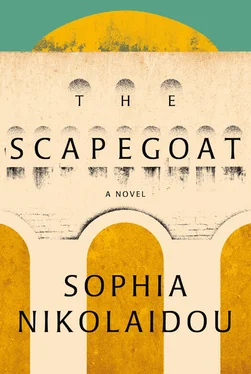But while he seemed affable and approachable when you first met him— a good kid , as his mother-in-law would say, and she knew him inside and out — he also didn’t hesitate to show his strength when circumstances called for it. And circumstances mainly called for it during staff meetings at the paper. The staffers need to know that a steady hand is in charge , was his motto. He barked at the editors. One well-respected staff writer was even seen crying in the bathroom after an important meeting. Everyone in the business agreed that Georgiou did his job, and did it well.
He had a say in every aspect of the paper, from the front page to the captions. Nothing escaped him, he picked the paper apart, right down to the horoscopes, which he held to the same standard as everything else. If you made some disparaging remark about their insignificance, he would cut you off in mid-phrase. Taken together, these things garnered his subordinates’ respect. He was always there in difficult times, his hand on the rudder; he never left anyone unprotected. He knew who actually worked and who just sat around scratching his balls. When he gave praise, he did so out loud and in public. If necessary, he made the careless feel like garbage, but always in the privacy of his office.
For years Tasos Georgiou had worked himself to the bone. He got home late, left early. He thought he’d found a way of balancing everything. Then came Minas’s first year of preschool, when Tasos came home one night to find Teta waiting up for him on the sofa. They opened a bottle of wine and Teta announced:
— This morning when I was walking Minas to preschool, he asked me, Mom, did Dad die? He wanted to know if you were still alive. He hasn’t seen you in five days.
She set her glass on the table, still untouched.
— You’ve got some choices to make, she warned.
From that day on, Georgiou made a point of spending each Saturday with Minas. He took him to the zoo, to museums, to parks. The three of them would eat together off the good china in the dining room, with a tablecloth. Pork roast, rice molded into little mounds, sautéed carrots, roasted potatoes. The world could start turning backwards, but he still wouldn’t work on a Saturday. He’d promised not to and he kept his word.
He watched as his child grew. A photograph of a gap-toothed Minas on the fridge, dressed as a snowman for the Christmas pageant when he was in first grade. The valentine his mother found in his book bag, written by a classmate, with the question, Minas, will you marry me? and a heart with an arrow through it. His report cards, all columns of perfect twenties. DVDs from family vacations. His first concert. All these things he’d accomplished.
Tasos didn’t make a big deal of it, but he believed his son was special. Tall, healthy, handsome. A fresh mind, with secret fixations and unexpected flights of fancy. Minas didn’t have many friends, and often spent whole days and nights in his room. But that had ceased to worry his father, who now had more important things on his mind. Teta had broken the news: Minas wouldn’t be going to university. He wasn’t interested in continuing his studies. Who would believe it if they heard? Cutting off his nose to spite his parents, is what he’d say if Minas were someone else’s child. But Tasos knew how rough the whole thing was on Teta. Pretty soon she was going to have to admit her son’s failure — and thus her failure, too — to all the other kids’ mothers, whom she hated running into anyway.
The worst part was that they had run out of arguments. You won’t find a job, these days a university degree is what a high school diploma used to be. You’ll be uncultivated, like a raw, unfinished slab of wood. We’ll sell the apartment and you can go to university abroad, wherever you want. Crisis or no crisis, we’ll manage. How on earth will we manage , Teta secretly fretted. She watched the news and couldn’t sleep for worry, twenty years of hard work and all they had to show for it was 80,000 euros in the bank. Even if Minas were to agree, that kind of money just wasn’t enough to send their son to school abroad.
At some point the stress got to be too much. She withdrew all the money from the Bank of Greece, flew to Cyprus and deposited it there. The low interest rate stung. You didn’t bring it here for the interest , the bank manager shot back. Teta grabbed the bank book and turned on her heel, cutting short all pretense and niceties. When she got back to Athens, she told Minas the money for his studies was safe.
Not that he cared. Minas had gotten his stubbornness from Teta’s side of the family: Evthalia’s Pontic mind never budged once it was made up. As the months passed, Georgiou realized that it wasn’t an act or pose. He even went with Teta to their son’s school, though he hadn’t set foot in the place in years. He listened as Minas’s teachers explained what the problem was, though none suggested a solution. They cared, but caring wasn’t enough.
Teta went back alone the next day to talk to Soukiouroglou, who assured her he’d do what he could to intervene. She knew Soukiouroglou wasn’t one to spout empty words. If he said something, he meant it — but the promises Teta wanted weren’t ones the teacher was able to make.
1948 AND EARLIER: “MOTHER, THERE’S A WAR ON OUT THERE. I’LL BE LATE.”
KYRIA MARIA GRIS, MOTHER OF MANOLIS
My lips may smile, but inside there’s sorrow .
We’re refugees. What did we know of Greece? We used to hear the name in church, for the good of Greece , Father Evgenios would chant. We would cross ourselves three times. I was born in Trapezounta. Trabzon. In a house by the sea. My hair would curl from the salt in the air. I’d wash it and iron it on the table to make it straight. I was a girl then, didn’t fear God, only my father. I was in love with the psalter in our district. A polite boy. His voice trembled when he sang the Good Friday lament, my sweet springtide , he sang with tears in his eyes and the mothers would cry, and we cried too, the girls who’d covered the bier of Christ with flowers that morning.
One day my father brought me a man to marry. From a good family, established in the town. They shook hands. I was fourteen years old, I thought I would die. My mother-in-law grabbed the silk from my dowry as fast as she could, as if it were hers. On the day I entered her house as a bride she made me wash her feet. So I would learn which of us ruled the roost. She made me kneel in the dirt. My husband watched and didn’t speak. Nor did the neighbor women who had gathered from nearby houses. I scrubbed her feet with my bare hands, tossed out the washwater, poured fresh into the tin basin and scrubbed some more. When I got tired, I lay her feet on my skirts to dry. I was wearing my best dress, my wedding dress. She dirtied it with her filthy feet. Then she pulled me up off the ground, kissed both cheeks and pushed me into the house. Come inside, girl , she said, yanking my braid.
We had four children. Manolis, Savvas, Evgnosia, and Violeta. Another two died on me, twins. I light candles for them on the Day of Lights, I learned that from my mother. I fill a basin with sand, stick the candles for the dead in there, so there’s a light to show my little birds the way. I lost them before they even tasted milk. You people here don’t know that tradition. You don’t bring your dead into the house.
My husband, Stathis, worked in the fields. A farmer. Nineteen years old, what could he know, you’ll say, of running a household, a beardless child himself. Quick to anger, and to punish the children. He never lifted a hand against them the way other fathers did, who hit their boys with belts. You could hear the screams from the street. Stathis just furrowed his brow and stared at us with that look of his, like a bull. It made our knees quake. He used to shut the littlest, Violeta, up in the barn with the animals, and left Manolis there to make sure she didn’t sneak out. My little girl never ate much, even as a baby. All she wanted was eggs, she couldn’t stand the sight of bean soup. He would let her go hungry and that imp still wouldn’t open her mouth to let a bite go down.
Читать дальше












